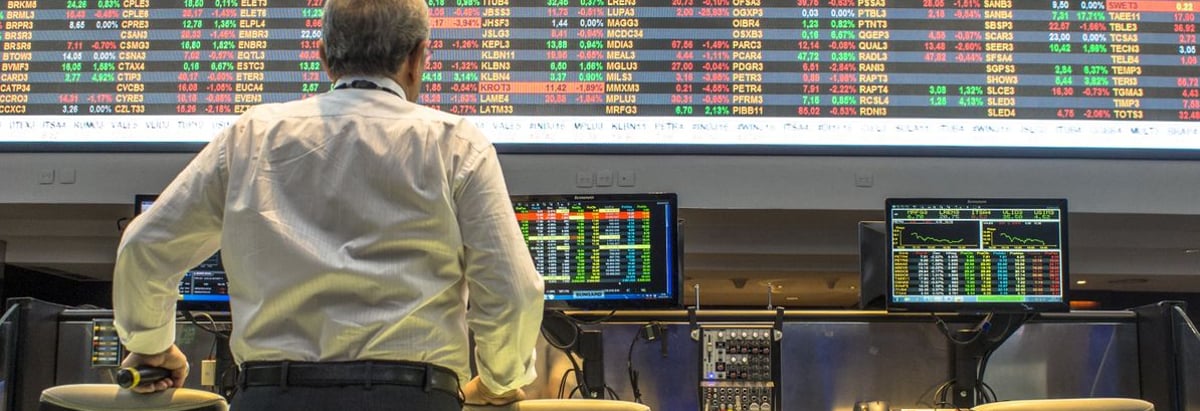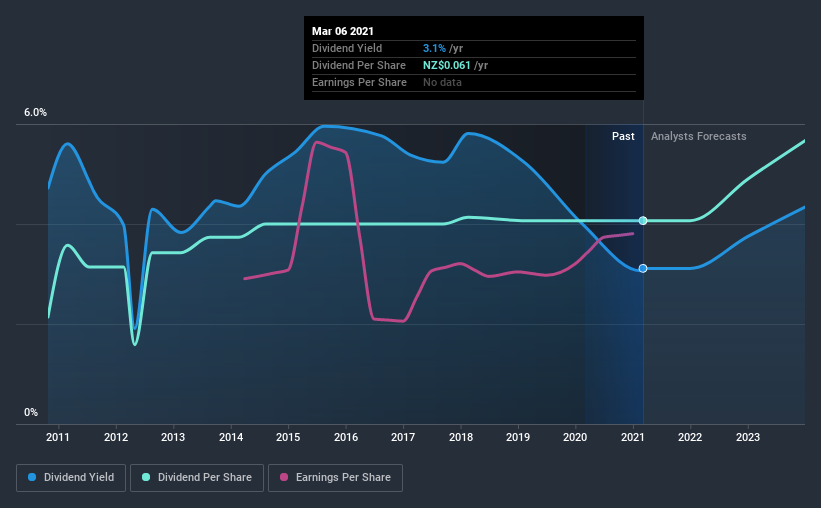- New Zealand
- /
- Capital Markets
- /
- NZSE:NZX
Don't Buy NZX Limited (NZSE:NZX) For Its Next Dividend Without Doing These Checks

NZX Limited (NZSE:NZX) is about to trade ex-dividend in the next 4 days. This means that investors who purchase shares on or after the 11th of March will not receive the dividend, which will be paid on the 26th of March.
NZX's upcoming dividend is NZ$0.036 a share, following on from the last 12 months, when the company distributed a total of NZ$0.061 per share to shareholders. Based on the last year's worth of payments, NZX stock has a trailing yield of around 3.1% on the current share price of NZ$1.96. Dividends are a major contributor to investment returns for long term holders, but only if the dividend continues to be paid. We need to see whether the dividend is covered by earnings and if it's growing.
See our latest analysis for NZX
If a company pays out more in dividends than it earned, then the dividend might become unsustainable - hardly an ideal situation. Last year NZX paid out 96% of its profits as dividends to shareholders, suggesting the dividend is not well covered by earnings.
When the dividend payout ratio is high, as it is in this case, the dividend is usually at greater risk of being cut in the future.
Click here to see the company's payout ratio, plus analyst estimates of its future dividends.

Have Earnings And Dividends Been Growing?
When earnings decline, dividend companies become much harder to analyse and own safely. If earnings decline and the company is forced to cut its dividend, investors could watch the value of their investment go up in smoke. NZX's earnings per share have fallen at approximately 6.9% a year over the previous five years. Ultimately, when earnings per share decline, the size of the pie from which dividends can be paid, shrinks.
The main way most investors will assess a company's dividend prospects is by checking the historical rate of dividend growth. NZX has delivered 6.6% dividend growth per year on average over the past 10 years. That's intriguing, but the combination of growing dividends despite declining earnings can typically only be achieved by paying out a larger percentage of profits. NZX is already paying out 96% of its profits, and with shrinking earnings we think it's unlikely that this dividend will grow quickly in the future.
To Sum It Up
Has NZX got what it takes to maintain its dividend payments? Earnings per share are in decline and NZX is paying out what we feel is an uncomfortably high percentage of its profit as dividends. It's not that we hate the business, but we feel that these characeristics are not desirable for investors seeking a reliable dividend stock to own for the long term. NZX doesn't appear to have a lot going for it, and we're not inclined to take a risk on owning it for the dividend.
Having said that, if you're looking at this stock without much concern for the dividend, you should still be familiar of the risks involved with NZX. For instance, we've identified 2 warning signs for NZX (1 is potentially serious) you should be aware of.
We wouldn't recommend just buying the first dividend stock you see, though. Here's a list of interesting dividend stocks with a greater than 2% yield and an upcoming dividend.
When trading NZX or any other investment, use the platform considered by many to be the Professional's Gateway to the Worlds Market, Interactive Brokers. You get the lowest-cost* trading on stocks, options, futures, forex, bonds and funds worldwide from a single integrated account. Promoted
Valuation is complex, but we're here to simplify it.
Discover if NZX might be undervalued or overvalued with our detailed analysis, featuring fair value estimates, potential risks, dividends, insider trades, and its financial condition.
Access Free AnalysisThis article by Simply Wall St is general in nature. It does not constitute a recommendation to buy or sell any stock, and does not take account of your objectives, or your financial situation. We aim to bring you long-term focused analysis driven by fundamental data. Note that our analysis may not factor in the latest price-sensitive company announcements or qualitative material. Simply Wall St has no position in any stocks mentioned.
*Interactive Brokers Rated Lowest Cost Broker by StockBrokers.com Annual Online Review 2020
Have feedback on this article? Concerned about the content? Get in touch with us directly. Alternatively, email editorial-team (at) simplywallst.com.
About NZSE:NZX
Flawless balance sheet with solid track record and pays a dividend.
Market Insights
Community Narratives



